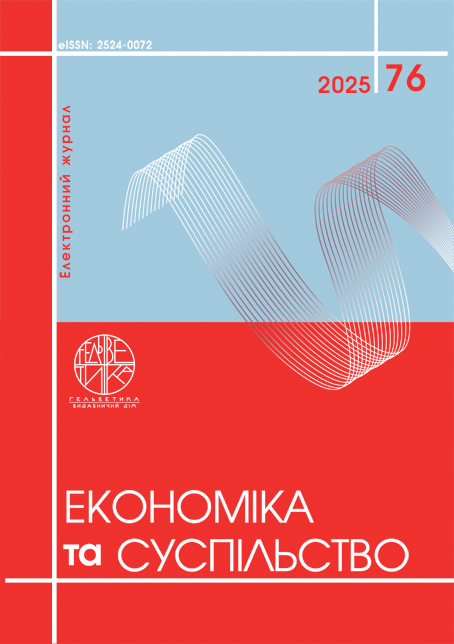TRENDS IN THE DIGITAL TRANSFORMATION OF UNIVERSITIES AND DIGITAL ACTIVATORS OF CHANGE
Abstract
The article examines key aspects of the digital transformation of universities in the context of the increasing role of information and communication technologies in shaping a new educational architecture. It justifies the need to revise traditional models due to technological progress, global competition, and growing stakeholder expectations. The concept of a digital university is presented as an institutional form that ensures flexibility, openness, personalization, and efficiency. Special focus is placed on digital activators, particularly digital avatars, which act as virtual agents of participants, enabling adaptive learning management, automated feedback, and role replication. A generalized model of a digital avatar as a complex socio-technological object is proposed, along with scenarios for university development based on digital maturity and institutional capacity. The results can be applied in shaping digital strategies, modernizing management, and creating personalized educational environments.
References
Kortemeyer, G., Dittmann-Domenichini, N., & Merki, C. (2025). Attending lectures in person, hybrid or online at a technical university: how do students choose after the pandemic, and what about the outcome?. Discover Education, 4(1), 94. DOI: https://doi.org/10.1007/s44217-025-00500-y
Kolodinska, Ya. O., Sklyarenko, O. V., & Nikolaievskyi, O. Yu. (2022). Practical aspects of developing innovative business ideas using digital services. Ekonomika i upravlinnia – Economics and Management, (4), 53–60. DOI: https://doi.org/10.36919/2312-7812.4.2022.53 [in Ukrainian]
Kozhyna, A. (2022). Reducing poverty, inequality and social exclusion in European countries based on inclusive approaches to economic development. Economics and Management of the National Economy. The Crisis of National Models of Economic System, 29–32. DOI: https://doi.org/10.30525/978-9934-26-269-2-7
Kubiv, S. I., Bobro, N. S., Lopushnyak, G. S., Lenher, Y. I., & Kozhyna, A. (2022). Innovative potential in European countries: analytical and legal aspects. International Journal of Economics and Business Administration, 8(2), 250–264. DOI: https://doi.org/10.35808/ijeba/457
Lopuschnyak, H. N., Chala, O., & Poplavska, O. (2021). Socio-economic determinants of the ecosystem of sustainable development of Ukraine. IOP Conference Series: Earth and Environmental Science, 915(1), 012019. DOI: https://doi.org/10.1088/1755-1315/915/1/012019
Kortemeyer, G., & Nöhl, J. (2025). Assessing confidence in AI-assisted grading of physics exams through psychometrics: An exploratory study. Physical Review Physics Education Research, 21(1), 010136. DOI: https://doi.org/10.1103/PhysRevPhysEducRes.21.010136
Kozynec, A. (2024). Motivational environment in higher education institutions in the system of international comparisons. Věda a perspektivy, 12(43), 206–214. DOI: https://doi.org/10.52058/2695-1592-2024-12(43)-206-214 [in Ukrainian]
Krap, A., Bataiev, S., Bobro, N., Kozub, V., & Hlevatska, N. (2024). Examination of digital advancements: their influence on contemporary corporate management methods and approaches. Multidisciplinary Reviews, 7(26). DOI: https://doi.org/10.31893/multirev.2024spe026
Sklyarenko, O. V., Yahodzinskyi, S. M., Nikolaievskyi, O. Yu., & Nevzorov, A. V. (2024). Digital interactive learning technologies as an integral part of the modern educational process. Innovatsiina pedahohika – Innovative Pedagogy, 68(2), 51–55. DOI: https://doi.org/10.32782/2663-6085/2024/68.2.51 [in Ukrainian]
Khomenko, O. O., Paustovska, M. V., & Onyshchuk, I. A. (2024). The impact of interactive technologies on the learning process and development of higher education seekers. Naukovi innovatsii ta peredovi tekhnolohii – Scientific Innovations and Advanced Technologies, 5(33), 1222–1231. DOI: https://doi.org/10.52058/2786-5274-2024-5(33)-1222-1231 [in Ukrainian]
Bobro, N., Hyshchuk, R., Strunhar, A., Bukovskyi, O., & Alekseiko, V. (2024). Exploring the role of AI in shaping future marketing strategies: evaluations and outlooks. Amazonia Investiga, 13(80), 43–53. DOI: https://doi.org/10.34069/AI/2024.80.08.4
Lysenko, S., Bobro, N., Korsunova, K., Vasylchyshyn, O., & Tatarchenko, Y. (2024). The role of artificial intelligence in cybersecurity: Automation of protection and detection of threats. Economic Affairs, 69(Special Issue), 43–51. DOI: https://doi.org/10.46852/0424-2513.1.2024.6
Bobro, N. (2025). Use of digital avatars in the learning process as a factor of economic efficiency. International Scientific Conference “Economic Transformation in the Context of Global Challenges: Current Issues”: Conference Proceedings (February 7–8, 2025, Klaipeda, Lithuania), 7–10. DOI: https://doi.org/10.30525/978-9934-26-529-7-3
Kortemeyer, G., Dittmann-Domenichini, N. Merki, C., Attending lectures in person, hybrid or online at a technical university: how do students choose after the pandemic, and what about the outcome?. Discover Education, 2025, 4(1), p.94. DOI: https://doi.org/10.1007/s44217-025-00500-y
Колодінська Я.О., Скляренко О.В., Ніколаєвський О.Ю. Практичні аспекти розробки інноваційних бізнес ідей з використанням цифрових сервісів. Економіка і управління. 2022. № 4. С. 53-60. DOI: https://doi.org/10.36919/2312-7812.4.2022.53.
Kozhyna, A. Reducing Poverty, Inequality and Social Exclusiom in European Countries. Based on Inclusive Approaches to Economic Development. Economics and Management of The National Economy, The Crisis of National Models of Economic System, 2022. Pp. 29-32. DOI: https://doi.org/10.30525/978-9934-26-269-2-7
Kubiv S.I., Bobro N.S., Lopushnyak G.S., Lenher Y.I., Kozhyna A. Innovative potential in European countries: analytical and legal aspects. International Journal of Economics and Business Administration, 8(2), pp. 250–264. DOI: https://doi.org/10.35808/ijeba/457
Lopuschnyak, H. N. Chala, O. Poplavska. Socio-economic determinants of the ecosystem of sustainable development of Ukraine. IOP Conf. Series: Earth and Environmental Science. 2021. 1. С. 1-9. DOI: https://doi.org/10.1088/1755-1315/915/1/012019
Kortemeyer, G., Nöhl, J. Assessing confidence in AI-assisted grading of physics exams through psychometrics: An exploratory study. Physical Review Physics Education Research, 2025. 21(1), p. 010136. DOI: https://doi.org/10.1103/PhysRevPhysEducRes.21.010136
Krap, A., Bataiev, S., Bobro, N., Kozub, V., Hlevatska, N. Examination of digital advancements: Their influence on contemporary corporate management methods and approaches. Multidisciplinary Reviews. 2024. 7(26). DOI: https://doi.org/10.31893/multirev.2024spe026
Скляренко О.В., Ягодзінський С.М., Ніколаєвський О.Ю., Невзоров А.В. Цифрові інтерактивні технології навчання як невід’ємна складова сучасного освітнього процесу. Інноваційна педагогіка. 2024. № 68 (2). С. 51-55. DOI: https://doi.org/10.32782/2663-6085/2024/68.2.51
Хоменко О. О., Паустовська М. В., Онищук І.А. Вплив інтерактивних технологій на процес навчання і розвиток здобувачів вищої освіти. Наукові інновації та передові технології. 2024. № 5(33). С. 1222–1231. DOI: https://doi.org/10.52058/2786-5274-2024-5(33)-1222-1231
Bobro N., Hyshchuk R., Strunhar A., Bukovskyi O., Alekseiko V. Exploring the role of AI in shaping future marketing strategies: evaluations and outlooks. Amazonia Investiga. 2024. Vol. 13(80). P. 43–53. DOI: https://doi.org/10.34069/AI/2024.80.08.4
Lysenko S., Bobro N., Korsunova K., Vasylchyshyn O., Tatarchenko Y. The Role of Artificial Intelligence in Cybersecurity: Automation of Protection and Detection of Threats. Economic Affairs. 2024. Vol. 69(Special Issue). P. 43–51. DOI: https://doi.org/10.46852/0424-2513.1.2024.6
Bobro N. Use of digital avatars in the learning process as a factor of economic efficiency. International Scientific Conference “Economic Transformation in the Context of Global Challenges: Current Issues”: Conference Proceedings (February 7–8, 2025, Klaipeda, Lithuania). P. 7–10. DOI: https://doi.org/10.30525/978-9934-26-529-7-3
Copyright (c) 2025 Наталія Бобро

This work is licensed under a Creative Commons Attribution 4.0 International License.


